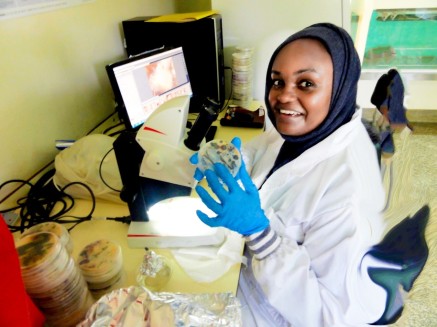
Marwa sees wonders in the lab. Her work with flies is a thrilling experience and fills her life with lots of enchantment. Photo:Fedilis Levi
The queen of black soldier flies tells us about her inspirations and her little ravenous babies… they help us more than we think… 😀
My name is Marwa Abdul Hamid Shumo. Although currently dividing my time between Bonn, Germany and Nairobi, Kenya, my compass can never beat but for the place I grew up in, that has to be Muscat, Oman 🙂
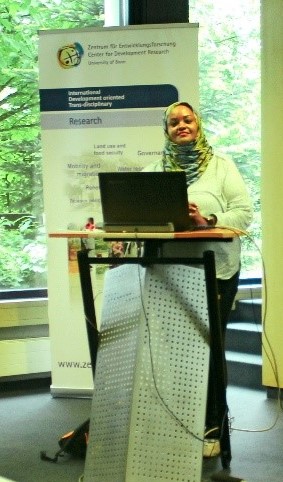
By talking to the people about her research, Marwa has an eyebrow raising story to tell to the world. Photo: Evin Erenler
What’s your work about?
My work is all about black soldier flies reared on organic waste such as kitchen left overs, cow dung and chicken manure into protein rich livestock feed. I investigate the potential of replacing the costly animal feed products currently present in markets such as fishmeal, soy cake and sunflower seeds pallets with a more cost effective and an environment friendly product derived from insects while taking into consideration the international standards for feed nutritional value and safety.

- Black soldier fly larvae feeding on kitchen waste in Marwa Shumo’s Lab at icipe. Photo: Marwa Shumo
What do you like the most about your work/what’s your motivation?
I have always been obsessed with waste. The amount of wastes over occupying landfills, incinerators and recycling plants is huge and it’s such a pity to let go of products rich in nutritional elements and minerals at a time our planet is suffering from resources limitations and scarcities. Let alone the costs invested in chemical and mechanical waste treatment processes as well as their hazardous impacts to our environments. I was looking for a bio sustainable and a cost effective method to use in recycling organic waste and ever thinking of how possible is it to turn our trash into cash.

Black soldier flies and their appetite for melons increase Marwa’s appetite for wonder! Photo: Marwa Shumo
I found that in my research project that I am engaged right now: the Potential use of Black Soldier Flies in bioconversion and feed production. I like the fact that my research – if proved to be of economical as well as biological significance- can influence and improve the livelihoods of farmers in the developing world by enabling them to produce their livestock feed by recycling their waste, thus saving them the economic burden of purchasing expensive livestock feed products from the markets.

An adult black soldier fly under an HD microscope taken at icipe‘s behavioural ecology lab. Photo: Marwa Shumo
5 things we all should know about flies
- Flies are not filth, in fact their role in the web of life is to get rid of filth. You would be amazed by their potential in changing the physical and chemical structure of organic waste.
- Flies aren’t necessary pests. Yes some flies can cause diseases in crops but not the black soldier flies.
- Flies aren’t necessary pathogenic vectors. Yes some flies can carry on pathogens from A to B and cause diseases but not the black soldier flies.
- Just like bee keepers who keep bees to produce honey, some people keep flies to produce bio compost- organic soil fertilizers.
- Cost effective. They can feed on almost anything organic and as adults they need nothing but water to survive and produce a second generation.

Fly art: Flychelangelo/Magnus Muhr
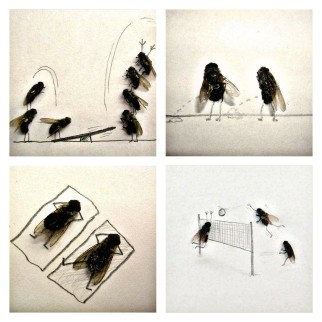
.
Some anecdote you would like to share?
During a summer Water, Sanitation, Health & Hygiene (WASH) casual position in Darfur, Western Sudan for the benefit of the American Refugees Committee in 2014, I experienced how difficult it is to be living with limited resources and to be in a daily struggle just to pick up a bucket of dirty water out of a contaminated saline well. How discouraging it might be for a child to have to walk miles and miles under the burning sun just to get to a school that is basically nothing but an empty space with some wooden sticks on the top and supposed to be acting as a roof top. While talking to little Darfurian girls who lived in refugee tents made out of plastic sheets, I figured out that they had the same dreams I had as a little girl, they want to be teachers, doctors and nurses and they want to travel the world. Unlike the little girls in Darfur, I never lived in a conflict zone, I had parents who provided me with more than my basic needs since the day I was born and their contributions to my life as a child and an adolescent shaped me into the adult I am today.

Girls collecting water in a Darfur Camp. Photo: Eva-Lotta Janssen/Oxfam
The encounters I had in Darfur left a great impact on my life not only as a human but as a scientist too, the harsh environment, the lack of sanitation and the limited possibilities of the utilization of environment resources amidst political conflicts all encouraged me to engage along with the rest of ZEF, Uni Bonn scholars in development research. Development research is all about making a difference in the livelihoods of people in the developing world rather than the ultimate goal of publishing research in glamorous peer reviewed journals like Science and Nature. Every now and then I look into the photos I took while in Darfur, and promise myself to do whatever I can with my science for the sake of improving the livelihoods of disadvantaged people in the developing world.
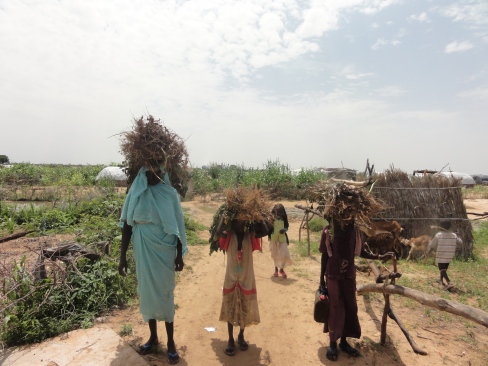
Women in Darfur, Sudan. Photo: Marwa Shumo
Another message for the readers?
“Don’t go where the path may lead, go instead where there is no path…and leave a trail” -Ralph Waldo
When I first started this project, many people discouraged me and thought that flies were too small to be studied or perhaps useless and that’s why not so many people work with them. After almost two years, more and more people are becoming interested in my field of research and I get to say that I was one of the pioneers 🙂
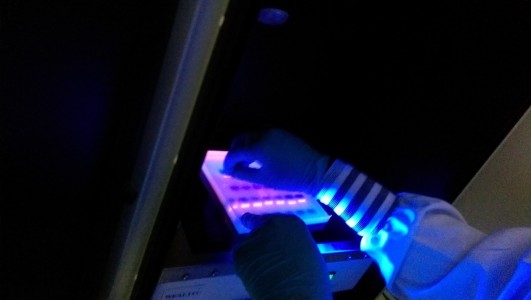
We are what we eat and this also applies to insects. Studying the genetic composition of black soldier flies gut load is an important objective of Marwa’s research. Extracting DNAs at icipe‘s pathology lab. Photo: Marwa Shumo
Where can we find more about your work?
You can read more about my work and research at Center for Development Research (ZEF) blog, where I frequently write about my day to day encounters as a junior researcher and a doctoral scholar.
Here is the link to my profile at ZEF’s blog
Pingback: La Brújula Que/ The beating compass – ZEF-Researchers report about their work